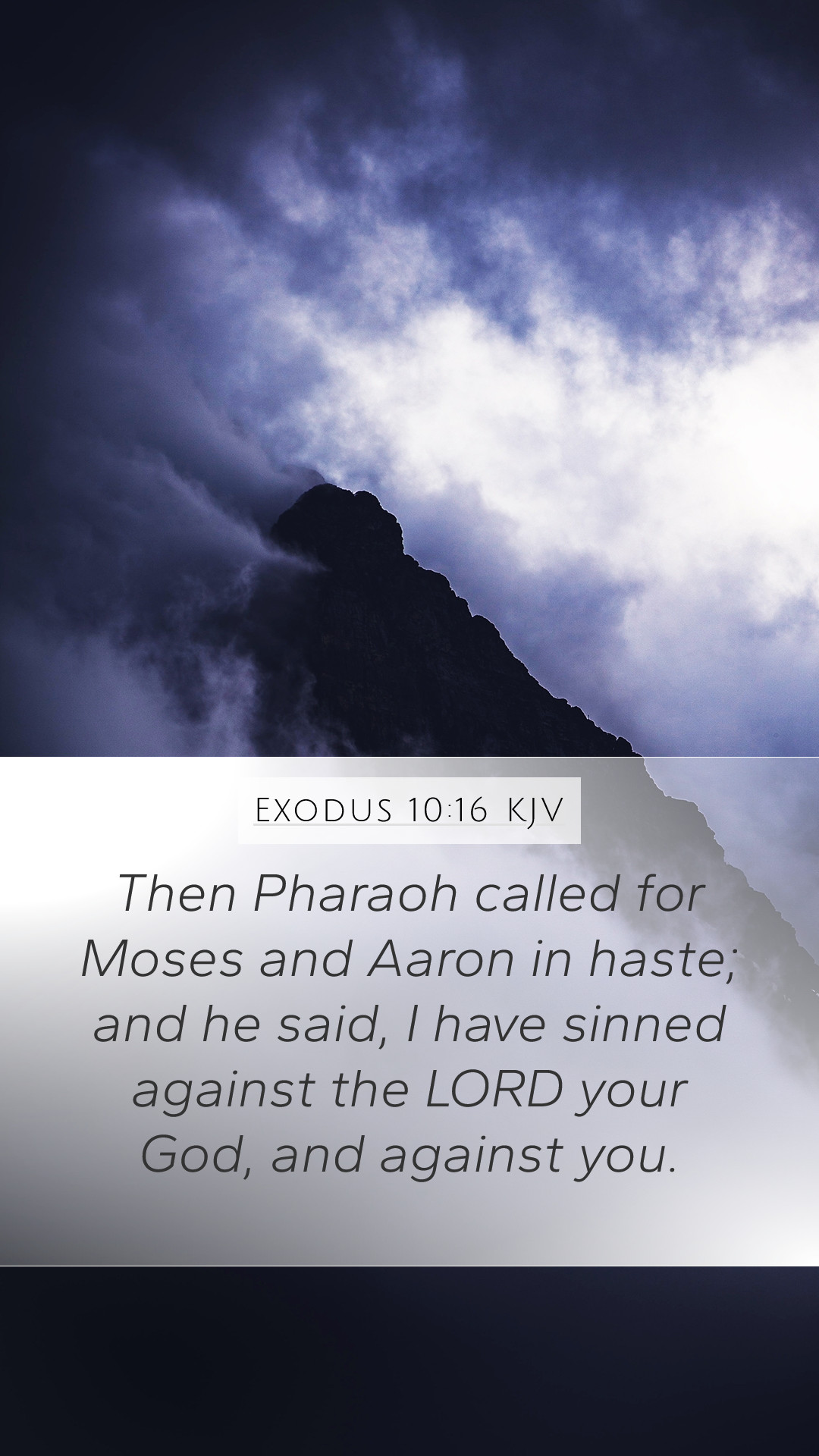Understanding Exodus 10:16
Bible Verse: Exodus 10:16 - "Then Pharaoh called for Moses and Aaron in haste; and he said, 'I have sinned against the Lord your God, and against you.'
Bible Verse Meaning
Exodus 10:16 presents a turning point in the narrative of the plagues that God sent upon Egypt. Pharaoh, confronted with the dire consequences of his actions, acknowledges his sin against God and the Israelite leadership. This verse encapsulates a moment of desperation and realization that serves multiple purposes within the overall narrative of the Exodus.
Commentary Insights
-
Matthew Henry's Commentary:
Henry notes that Pharaoh's confession is rooted in the fear of the immediate consequences of the plagues. He reflects on the wickedness of the heart that, even when faced with judgment, the acknowledgment of sin can be superficial. This highlights the human tendency to turn to God only in times of distress rather than from true repentance.
-
Albert Barnes' Notes:
Barnes emphasizes the significance of the words "I have sinned." This phrase, coming from Pharaoh, showcases the recognition of wrongdoing. However, Barnes further critiques that this confession lacks the depth of genuine repentance, as evidenced by Pharaoh's subsequent actions. Though he acknowledges his sins, he quickly reverts to his original stubbornness when relief is granted.
-
Adam Clarke's Commentary:
Clarke discusses the psychological and spiritual dimensions of Pharaoh's admission. He argues that Pharaoh's acknowledgment reflects an attempt at manipulation, using the moment of distress to regain favor while still holding onto his pride. Clarke connects this back to the nature of repentance, noting that true repentance requires a lasting change of heart rather than a momentary admission in the face of calamity.
In-depth Analysis
This verse serves as an illustration of the struggle between divine will and human resistance. Pharaoh's character is a reflection of humanity's often superficial engagement with faith and repentance. Understanding this verse requires a multilayered approach, considering not just the text but also the historical context and the larger narrative of Israel's liberation from bondage.
Historical Context
To fully appreciate Exodus 10:16, one must consider the broader events of the Exodus story, including the brutality of Egyptian oppression and the ten plagues that God inflicted upon Egypt as a form of judgment. This moment is situated within a history of hard-heartedness from Pharaoh, suggesting that understanding Scripture often requires an examination of historical context and character motivations.
Application to Daily Life
While this scripture is anchored in its historical context, its lessons extend to contemporary readers. The idea of turning to God in times of trouble—a common human reaction—raises questions about the sincerity of such actions. Are our confessions to God rooted in genuine repentance, or are they merely cries for help in moments of crisis? This reflection encourages both personal and communal examination of faith practices.
Related Bible Cross References
- Exodus 9:27 - Pharaoh's initial recognition of wrongdoing.
- Exodus 10:3 - God's command to Moses regarding Pharaoh's heart.
- Romans 2:4 - Discusses God's kindness leading to repentance.
- 2 Corinthians 7:10 - Speaks about godly sorrow leading to repentance.
- Job 33:27-28 - Acknowledgment of sin and God's forgiveness.
- Psalms 51:3 - A prayer of confession and repentance.
Conclusion
Exodus 10:16 serves as a powerful reminder of the nature of human interaction with divine authority. Through commentary insights and scripture analysis, we gain a deeper understanding of what it means to repent, the challenges of genuine acknowledgment of sin, and the call to reflect on our spiritual lives in light of God's grace and judgment.
For those engaging in Bible study groups or exploring various Bible study resources, this verse offers rich grounds for discussion on themes of repentance, the nature of sin, and the complexities of faithfulness under pressure.


